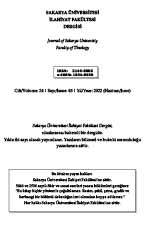Türkiye'de Şer'i Yönetişim: Banka İçi Danışma Komiteleri Örneği
Shariah Governance in Turkey: A Case Study on In-Bank Advisory Committees
Author(s): İsmail Bektaş, Ali Can YeniceSubject(s): Economy, Theology and Religion, Islam studies, Financial Markets, Sharia Law
Published by: Sakarya üniversitesi
Keywords: Islamic Economics; Shariah Governance; Shariah Governance in Turkey; In-Bank Advisory Committees; Case Study; Fatwa;
Summary/Abstract: Islamic finance has developed the Shariah governance mechanism to ensure compliance and control of IFIs with the principles of Islamic law. However, the levels of Shariah governance are different from each other due to the different legal affiliations of each country, the level of development of Islamic finance, and regime differences. International Islamic financial institutions such as Islamic Financial Services Board (IFSB) and The Accounting and Auditing Organization for Islamic Financial Institutions (AAOIFI) have published standards to define the general lines of Shariah governance and have brought Shariah governance practices to a certain point, at least in principle. After the Shariah governance standards of IFSB (2009) and AAOIFI (1997), studies on Shariah governance have increased rapidly. By 2010, while there were only 18 publications on Shariah governance in the two most well-known indexes (Scopus and Web of Science), this number increased to 42 in 2015 and 159 in 2020. This academic interest shows that Shariah governance issues are followed closely. In this context, there have been some remarkable developments at the regulatory and supervisory level in terms of Shariah governance in Turkey, and the TKBB (Participation Banks Association of Turkey) Advisory Board was established in 2018, bringing one step closer to international Shariah governance practices.
Journal: Sakarya Üniversitesi İlahiyat Fakültesi Dergisi (SAUIFD)
- Issue Year: 24/2022
- Issue No: 45
- Page Range: 29-60
- Page Count: 32
- Language: Turkish

